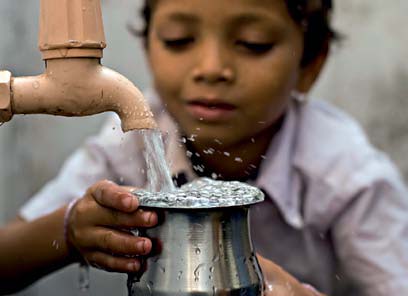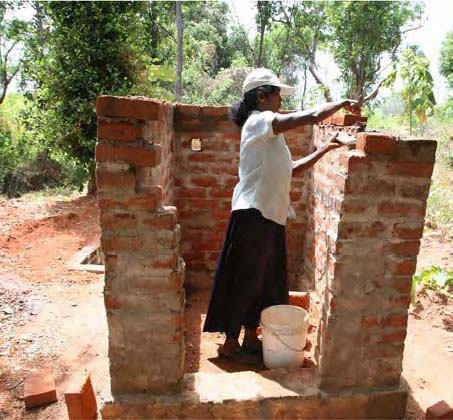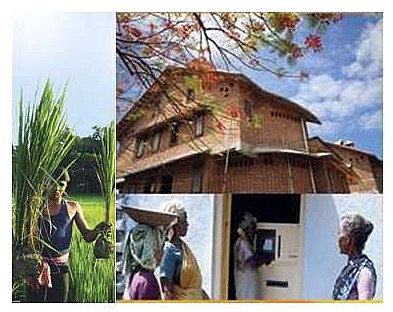/topics/conservation-reducing-water-usage
Conservation - Reducing Water Usage
Sustainable resources management for food security and sustainable livelihoods - Action - A Newsletter of AFPRO
Posted on 30 Oct, 2011 07:46 AMThese technologies include soil and water conservation measures, integrated farming, diversion based irrigation systems, sustainable agriculture, tree-based farming to name a few.
Where and how is the state - Accessing water and the state in Mumbai and Johannesburg - Journal of Asian and African Studies
Posted on 29 Oct, 2011 05:28 PMThis paper published in the Journal of Asian and African Studies examines the argument that the political and institutional contexts of service delivery shape people's access to the state and its resources and also the mediation between citizens and g
New hope for Indian food security? The System of Rice Intensification – A paper by International Institute for Environment and Development
Posted on 29 Oct, 2011 11:43 AMThis paper from the gatekeeper series of the International Institute for Environment and Development (IIED) describes the potential of an innovative rice cultivation practice-the system of rice intensification (SRI)—for allowing Indian rice farmers to not only enhance rice production and their net incomes, but also to solve the water crisis.
Towards drinking water security in India: Lessons from the field – A report by Water and Sanitation Program
Posted on 29 Oct, 2011 11:33 AM This report by the Water and Sanitation Program of the World Bank provides an account of the field level initiatives on drinking water security in India. The country faces many challenges in ensuring reliable, sustainable safe drinking water supply to rural households.
This report by the Water and Sanitation Program of the World Bank provides an account of the field level initiatives on drinking water security in India. The country faces many challenges in ensuring reliable, sustainable safe drinking water supply to rural households.
Though, in terms of provision of safe drinking water, more than 90 percent of the rural households have been covered, according to the NSSO 65th round survey 2008-09, much remains to be done to improve levels of service delivery, water quality and sustainability.
Decentralised treatment and recycling of domestic wastewater - An integrated approach to water management - A pilot project - CPCB (2008)
Posted on 27 Oct, 2011 10:32 AMThis report by the Central Pollution and Control Board (CPCB) describes the various intervention measures chosen to reduce the ecological footprint of the Sangamam housing project at Auroville. These measures include water harvesting, recycling and waste management.
Mapping drought patterns and impacts: A global perspective – A research report by IWMI
Posted on 26 Oct, 2011 08:11 PMThis study by the International Water Management Institute (IWMI) examines the global patterns and impacts of droughts through the mapping of several drought-related characteristics – either at a country level or at regular grid scales. Characteristics cover various aspects of droughts – from global distribution of meteorological and hydrological drought risks to social vulnerability and indices related to water infrastructure.
Climate change impact on hill agriculture and farmers adaptive strategies – A case study of Kullu valley in Himachal Pradesh
Posted on 26 Oct, 2011 06:35 PMIt takes apple as an indicator crop to investigate the positive and negative effects of climate change on farm economy. The research is a field study to determine the agricultural and socioeconomic impact of climate change on the farmers apple economy of the Kullu valley in Himachal Pradesh, India.
Evaluation of operation and maintenance of sewage treatment plants in India - Control of urban pollution series - CPCB (2007)
Posted on 26 Oct, 2011 03:39 PMThis study was commissioned recognizing the fact that discharge of untreated sewage occurs not only because of inadequate installed capacity of sewage plants, but also due to the inadequate maintenance of existing plants.
India’s sanitation for all: How to make it happen – A discussion paper by Asian Development Bank
Posted on 26 Oct, 2011 10:40 AM This discussion paper by the Asian Development Bank (ADB) examines the current state of sanitation services in India and offers recommendations that can help key stakeholders work toward universal sanitation coverage in India.
This discussion paper by the Asian Development Bank (ADB) examines the current state of sanitation services in India and offers recommendations that can help key stakeholders work toward universal sanitation coverage in India.
Providing environmentally-safe sanitation to millions of people is a significant challenge, especially in the world’s second most populated country. The task is doubly difficult in a country where the introduction of new technologies can challenge people’s traditions and beliefs.
This discussion paper examines the current state of sanitation services in India in relation to two goals—Goal 7 of the Millennium Development Goals (MDGs), which calls on countries to halve, by 2015, the proportion of people without improved sanitation facilities (from 1990 levels); and India’s more ambitious goal of providing “Sanitation for All” by 2012, established under its Total Sanitation Campaign.
Piloting Knowledge Swaraj - A hand book on Indian science and technology - KICS
Posted on 24 Oct, 2011 04:23 PMThis hand book on Indian science and technology was produced at the end of a project entitled “Science, Ethics and Technological Responsibility in Developing and Emerging Countries” (SET DEV) by Knowledge in Civil Society (KICS). The project aimed at:
- Activating processes of building institutional capacities and skills on science,ethics and STR socialization
- Defining and understanding perspectives of socialization of science and technology that take into consideration local needs in a multilateral dialogue.






